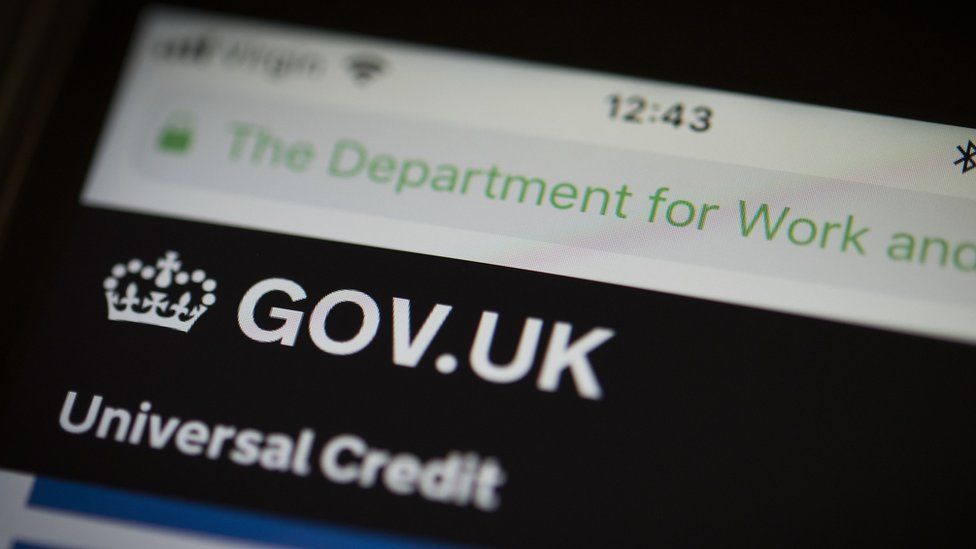
The government has stopped routinely suspending benefit claims flagged by its Artificial Intelligence (AI)-powered fraud detector, it has emerged.
The Department of Work and Pensions (DWP) uses the technology to identify potentially suspicious claims for Universal Credit (UC).
It was previously the case that applications were put on hold while officials investigated further.
But a top official has now confirmed the department is no longer doing this.
Neil Couling, a senior DWP civil servant, revealed the change in policy in evidence to a committee of MPs.
He told the committee the department had decided to change tack following "feedback from claimants and elected representatives".
His comments have not been widely reported, but it is thought to be the first time the DWP has publicly acknowledged its shift in approach. The BBC has asked the department to confirm when it changed.
The DWP has put its AI tool at the heart of a plan to tackle increasing levels of benefits fraud, projecting it could save the department £1.6bn by 2030/31 through better targeting of investigations.
It employs an algorithm powered by machine learning, a widely-used form of AI, to analyse historical data to identify higher-risk claims that are then referred for investigation by officials.
Since 2022 it has been used to screen claims for UC advances - up-front payments made to those in urgent need, which are then repaid monthly.
It was also revealed last year that the technology is being rolled out to help detect fraud in other areas, including where people have incorrectly declared their earnings or housing costs.
It had sparked concerns from campaigners that any potential bias in the system could lead to unfair payment delays for legitimate claimants.
The DWP has never disclosed how many claims have been flagged by the system, or how many suspensions have been applied as a result, making its impact difficult to assess.
'Quite a pickle'
Asked at the work and pensions committee last week whether it could cause delays, Mr Couling replied: "We actually changed our approach in the light of feedback from claimants and elected representatives.
"We used to suspend all the cases, and now we don't suspend," he said.
He added that the department's officials were able to investigate referrals more quickly as they had "caught up" with Covid-era backlogs.
Claims are now only put on on hold, he added, if claimants themselves fail to respond to inquiries from investigators.
Child Poverty Action Group, which has previously raised concerns about the algorithm, told the BBC it was glad that routine suspensions now appear to have stopped.
Sara Ogilvie, the group's policy director, said the practice raised "serious questions" and MPs needed "reassurances that it will not happen again".
Bias checks
The department has not disclosed how exactly its algorithm works, arguing that revealing too much information about it could undermine its attempts to tackle fraudsters.
It has promised to publish more information about its impact in the department's next set of annual accounts, due later this year.
Mr Couling said the DWP had processes in place to deal with potential bias, including by conducting checks at the design phase and monitoring who is referred.
"If you look at the experience of some other countries when they have tried to use this technique, they have got themselves into quite a pickle. I am determined that we do not do that in the UK," he added.
Also giving evidence to MPs, Peter Schofield, the DWP's top civil servant, said the department tried to carry out checks "as effectively as we can".
When asked if the technology could lead to a situation similar to the Horizon scandal, where postmasters were prosecuted for theft using evidence from faulty software, he replied: "I really hope not".
The algorithm is among a series of measures the DWP is using to tackle benefits fraud, which went up during Covid when some in-person checks were suspended.
The department previously forecast it could get fraud down to pre-pandemic levels by 2027/28, but Mr Schofield told MPs he didn't this would happen.
Mr Couling said he thought the impact of Covid had been overestimated, and had masked a trend towards a "greater acceptance of fraud" in society in recent years, including when it comes to declaring earnings.
A DWP spokesperson said: "The department continues to explore the potential of new technologies in combatting fraud but we have always been consistent that a member of staff will always make the final decision to determine fraud or error."
From BBC
